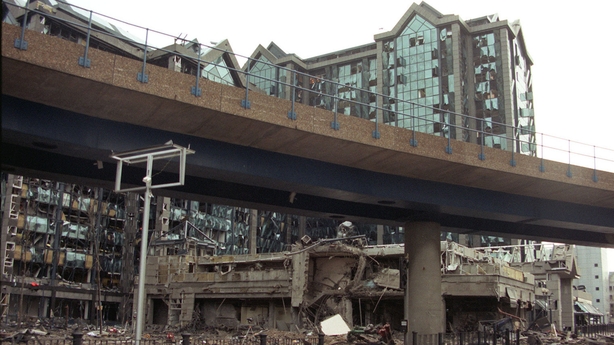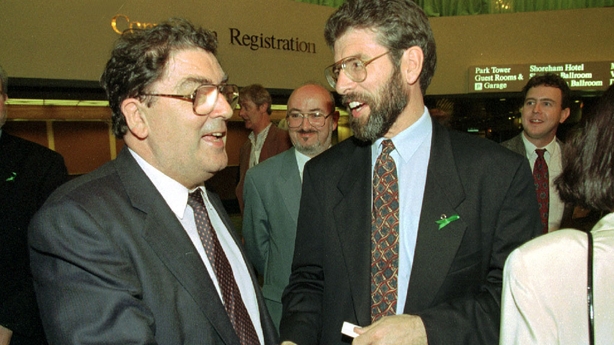By David McCullagh, Conor McMorrow and Justin McCarthy
John Bruton's election as taoiseach in December 1994 was the result of a series of unlikely events. The Fianna Fáil-Labour coalition had an unassailable majority in the Dáil, but the government was undone by a collapse in trust between taoiseach Albert Reynolds and tánaiste Dick Spring.
Their partnership nearly fell apart over the report of the Beef Tribunal, but was patched up, largely because of the peace process – the IRA ceasefire at the end of August 1994 was a triumph for Albert Reynolds, and looked like cementing him in power.
But then a controversy over an obscure extradition case erupted - and with trust between the coalition partners already strained to breaking point, Labour walked.
The result was that, to his own surprise as well as everyone else's, Bruton became taoiseach at the head of a Rainbow Coalition of Fine Gael, Labour and Democratic Left.
There was a lot on the new government's plate – though few challenges were quite as demanding and time-consuming as the peace process. Bruton occasionally got annoyed at the constant media focus on the subject, but he was well aware of the importance of keeping the show on the road.
The British were keeping an uneasy eye on the IRA in South Armagh, described by one official as 'still the danger point'
We now have a much greater insight into how he and his colleagues tried to do that, thanks to the release this week of the State Papers from the period – the previously secret government documents that show who was saying what to whom at the time.
This year, in an effort to bring the Irish release schedule into line with that of the UK, no less than eight years of files relating to Anglo-Irish relations are being released. Around 8,500 files – many of them containing hundreds of pages of documents – are now available for the public to view in the National Archives of Ireland.
There's plenty of reading there, with lots of interesting nuggets about how our government goes about its business. And there are plenty of insights into just how difficult – indeed, tortuous – the peace process was.
Decommissioning demand 'unnecessary'
The IRA ceasefire had seemed to herald a new dawn. But there were still worries – the British were keeping an uneasy eye on the IRA in South Armagh, described by one official as "still the danger point… They were the one part of the Provisional organisation which had the will and capacity to act independently, and they might do so".
But a more serious problem was with the British policy of insisting that the IRA should decommission at least some weapons before Sinn Féin could enter political talks on the shape of a settlement.
To most unionists, this seemed like simple common sense; to many nationalists, it looked like an unreasonable precondition designed to keep Sinn Féin out. The newly released State Papers show that both the most senior soldier in Northern Ireland, and the man who would shortly become Chief Constable of the RUC, believed that the decommissioning demand was unnecessary from a security point of view.
Read more:
Politicians behaving badly
8 things we learned from the State Papers: Day two
'Foolishly impaled': RUC’s view of decommissioning demands
Neither of them could be accused of being sympathetic to Sinn Féin - neither could the taoiseach. John Bruton was no fan of violent republicanism, and he was uncomfortable in the alliance with Sinn Féin which the peace process seemed to demand.
Heads of government are bombarded with paper each and every day – advice, reports, proposals flow across their desk from morning till night. Few of them have the time to put their own thoughts on the page. But Bruton made the effort, writing a memorandum in July 1995 which analysed what he felt were the weaknesses of the government's position, when, as he put it, "Sinn Féin hold all the cards".

One of Bruton’s concerns was that he and his government would be blamed if the IRA went back to war. And he was right. Plenty of people pointed the finger at him when the IRA resumed its campaign of violence - starting with a massive bomb in London's Docklands in February 1996 which killed two people.
The IRA's decision to take up arms again was a devastating blow to political leaders of all stripes – and to the long-suffering people of the North. The tension was ratcheted up in July with another stand-off over the Orange parade at Drumcree, with relations between Bruton and John Major hitting a frosty new low – though, as the head of the British army in Northern Ireland pointed out, the outcome of Drumcree could have been even worse.
Relations with Major hit another road bump that November, after London published its response to the latest proposals for restoring the ceasefire from John Hume and Gerry Adams.
Bruton wrote to Major complaining that this would lead to "a most confrontational debate"; Major responded that he had had no option but to publish the document, and criticised the taoiseach's tone: "This kind of approach to us is seriously counter-productive as I cannot co-operate with you as I wish, under duress" he said.

Bruton did not take this lying down, replying: "it is important that either of us tell the other, as an honest statement of fact, that a decision is potentially damaging where he believes the circumstances warrant it."
While Bruton was well able to argue his corner with Major, there was no doubt about his antipathy towards Sinn Féin. In April 1997, he told a delegation from the Northern Ireland Women’s Coalition that he wouldn’t meet Sinn Féin in advance of an IRA ceasefire: "We cannot be dealing with people who are associated with killing".
He was increasingly sceptical about the chances of a breakthrough, writing in April 1997: "I don’t think a 'comprehensive settlement’ is ever likely".
After the IRA murdered two RUC officers in Lurgan in June of that year, he fretted that they would declare a ceasefire to ensure that political talks would have to include Sinn Féin. "But the ceasefire will not prove genuine and they will continue to try to use their twin-tracks approach."
There wasn’t much optimism to be found – though analysis of an IRA escape attempt from the Maze provided a bit of light relief. Both Bruton and Major faced difficult election battles in the first half of 1997, raising the possibility that it would be left to others to find a way through the logjam.
Based on documents now available to view in the National Archives of Ireland.
